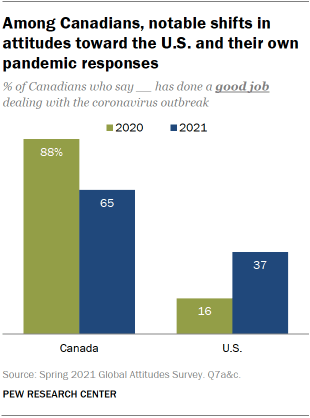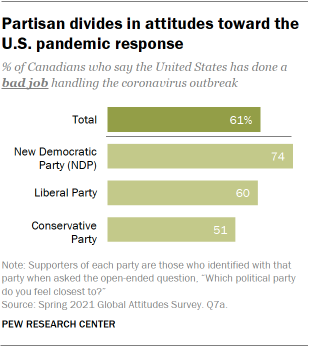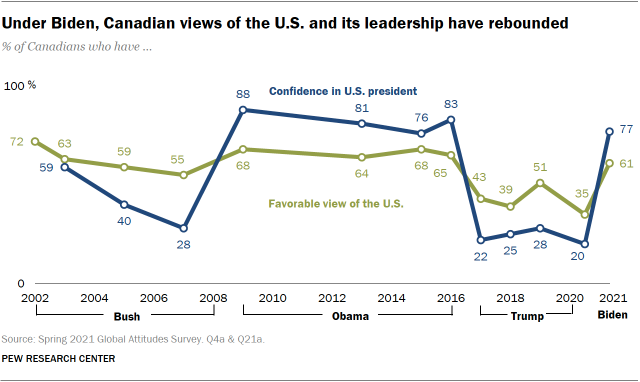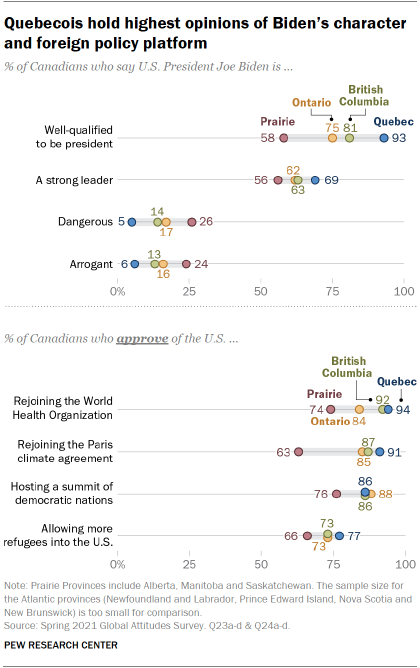
After a 17-month ban on nonessential travel between the United States and Canada prompted by the coronavirus outbreak, the Canadian government announced that fully vaccinated Americans will be allowed to enter Canada for nonessential travel beginning on Aug. 9. However, unvaccinated Americans will continue to be barred from entering the country.

This is in keeping with the attitudes of Canadians, a majority of whom are critical of how the U.S. has handled the coronavirus outbreak. Despite doubting the American response to the pandemic, Canadian adults shared decidedly favorable attitudes toward the U.S. in Pew Research Center’s spring 2021 survey of the country, a marked difference from 2020.
Canadian views of their own country’s and their southern neighbor’s handling of the pandemic have shifted considerably in the past year. Positive evaluations of Canada’s response to the virus have declined by 23 percentage points – though since our survey was fielded, Canada has seen rising vaccination rates and declining case counts. On the flip side, favorable assessments of the American response had ticked up 21 points at the time of polling, when the U.S. vaccination rate was rising precipitously. Progress in vaccinating Americans has since slowed. Overall, a sizable majority of Canadians say their country has managed the outbreak well while fewer than four-in-ten say the same of the U.S., a 28-point difference.

Partisan divides emerge in assessments of how the U.S. has handled the pandemic. Canadians who identify with the New Democratic Party (NDP) are more likely than supporters of both the governing Liberal Party and the Conservative Party to criticize the U.S. pandemic response. Still, half or more of each party’s supporters are critical of the American coronavirus response.

While Canadians are largely critical of their southern neighbor’s pandemic response, the U.S.-Canada relationship receives more mixed reviews. A 68% majority of Canadians consider the U.S. to be a reliable partner, yet only 34% think Canadian interests factor into American foreign policy decisions. And looking to the future, Canadians are split, with half saying they are optimistic that relations will get better in the next few years.
Still, the U.S. is viewed favorably by most Canadians, though these attitudes are divided. The U.S. garners the most support in the Prairie Provinces and Quebec and the least in British Columbia. Attitudes toward the U.S. are also divided by language and political preference, with French speakers and supporters of the Conservative Party holding the most favorable views and English speakers and supporters of the NDP sharing the most critical assessments.
In addition to rating the U.S. positively, most Canadians have confidence in President Joe Biden to do the right thing regarding world affairs, with 77% holding this view. Majorities also think he is well-qualified for the presidency and a strong leader, while few consider him to be arrogant or dangerous. His foreign policy platform is broadly popular as well.
These positive evaluations of Biden are a departure from those of his predecessor, who consistently received poor ratings from Canadians. Last summer, then-President Donald Trump earned the confidence of only a fifth of people in the country, the lowest rating of any U.S. president by Canadians since Pew Research Center began asking the question nearly two decades ago. Favorable views of the U.S. also took a hit, reaching an all-time low of 35% in 2020. Trump’s personality traits and foreign policies were also widely criticized. For example, 93% in Canada found the former president arrogant in 2017. By contrast, only 14% said the same of Biden this spring, a 79-point difference.

Biden is popular overall, though there are key differences between supporters of different parties and people living in different provinces. For instance, supporters of the Liberal Party are by far the most convinced of Biden’s qualifications for the presidency. While 96% of those who identify with the governing party think he is well-qualified to be president, only 88% of NDP supporters and half of Conservatives agree. In addition, support for Biden’s decision to rejoin the Paris climate agreement varies considerably across partisans. Nearly all supporters of the NDP and the Liberals approve of an American return to the agreement, compared with only about six-in-ten of those who back the Conservatives.

Across provinces, the move is most popular in Quebec and least popular in Alberta, Manitoba and Saskatchewan, where the agreement has major implications for local economies. Canada’s own plan to cut greenhouse gas emissions in compliance with the Paris accord relies heavily on changes to the oil and gas sector, a critical industry in the Prairie Provinces. In addition, the suspension of work on the Keystone XL Pipeline, another of Biden’s climate policy decisions aimed at curbing carbon emissions, presents major economic challenges to Alberta’s oil and gas industry.
Note: Here are the questions used for this analysis, along with responses. See our methodology database for more information about the survey methods.




